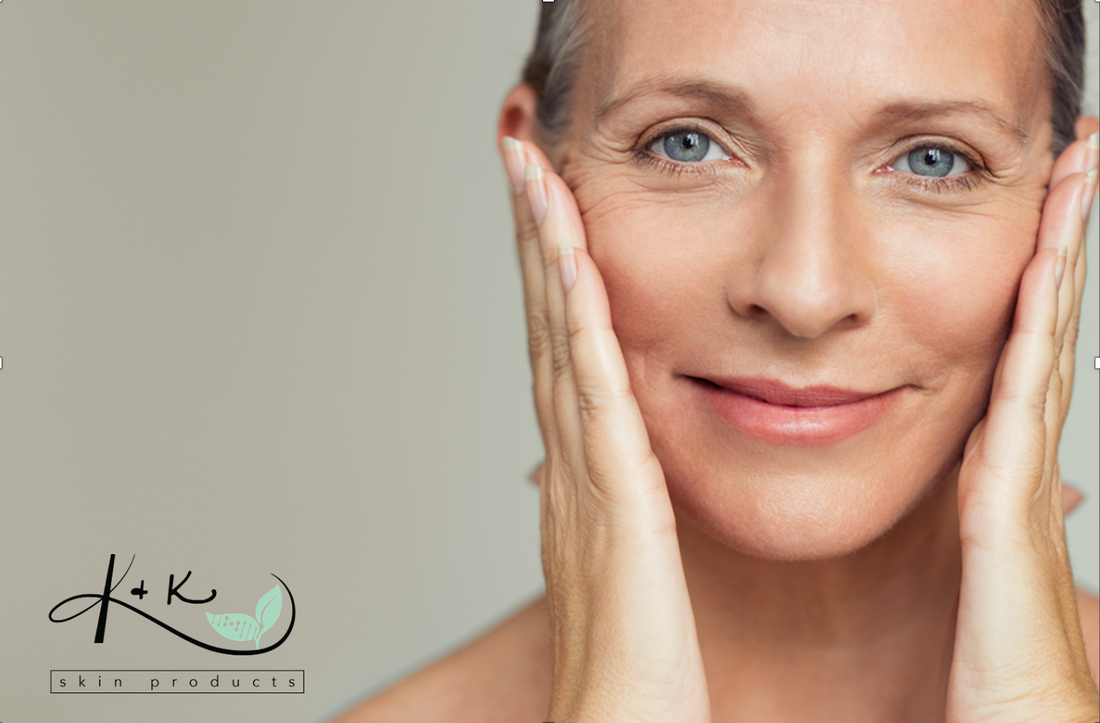None of us can avoid getting older, and hopefully getting older means getting wiser too. But some of us may fear losing our good looks as we age, and one of the worrisome physical signs of aging for many people is the formation of wrinkles – especially on the face or neck as these can make us look tired and rundown. But we’ve all seen people who are obviously older, but look absolutely radiant, and have a youthful glow. Thankfully, it is possible to keep our radiance as we age by embracing a healthier lifestyle and using the right skincare products.
4 Causes of Wrinkles
Aging reduces collagen
The number one cause of wrinkles is aging. The dermis – the middle layer of your skin – is composed of a protein called elastin and collagen fibers, both of which provide structure and elasticity to the topmost layer of your skin. When you get older, your skin cells begin to divide at a slower pace and the dermis begins to thin out. As it does, the dermis loses its elastin and collagen, and parts of the skin surface sink, creating those little ridge-like depressions we call wrinkles. As skin ages, it also loses its ability to retain moisture and produce nourishing oils. Because of this, skin usually becomes a lot stiffer and drier with age, and this also contributes to the onset of wrinkles.
Active facial muscles
Facial muscle contractions are another cause of wrinkles on the face. Facial wrinkles most commonly show up on the forehead, as frown lines between the eyebrows and crow’s feet on the outsides of the eyes, and as laugh lines along the sides of the mouth. This is because we use the muscles on our forehead, around our eyes, and on the side of our mouth more often than most other facial muscles, therefore the skin around these areas fold and crease more frequently. Over time, the repeated folding of skin around these areas combined with the loss of elastin and collagen and the effects of gravity, lead to the formation of deep and noticeable wrinkles on the face.
Sun damage
Too much exposure to ultraviolet (UV) rays from sunlight can lead to premature aging of the skin – a process known as photoaging. This is because UV rays destroy collagen fibers and contributes to the production of abnormal elastin. Once skin tissue has been damaged by UV rays, it produces an enzyme called metalloproteinase, which rebuilds collagen and elastin fibers but in a disorganized way. When the rebuilding process is repeated many times, skin heals less efficiently as fibers come together in a more disorganized structure, and wrinkles develop as a result.
Smoking
Healthy skin can constantly regenerate its own collagen supply, removing old, broken-down collagen and producing new collagen. However, researchers have found that cigarette smokers do not replenish skin collagen as well as non-smokers. Studies have found that smoking leads to the production of fewer elastin and collagen fibers in their skin and having fewer of these fibers makes skin stiffer and less elastic. Smokers are also particularly vulnerable to developing deeper laugh lines along the sides of their mouths.
How to prevent wrinkles
A Healthy Diet & Exercise
Eating a nutritious diet with plenty of vitamin C can help slow down the development of wrinkles. “Vitamin C is not only an antioxidant to fight free radicals, but is also needed to help enzymes make collagen,” says Dr. Patricia Farris, a dermatologist and clinical assistant professor at Tulane University School of Medicine and spokesperson for the American Academy of Dermatology. Vitamin C can help fight photoaging and help skin cells to regenerate, which in turn prevents the formation of wrinkles. As skin thins, wrinkles become more visible. Linoleic acid, which is found in soybean oil, canola oil, walnuts, almonds, and edamame can prevent skin thinning and reduce the appearance of wrinkles. You can include foods with linoleic acid vitamin C in your diet to give your skin a nutritional boost to slow down the ravages of time.
Regular exercise can also help prevent wrinkles by keeping the stress-related hormone cortisol in a healthy balance. An excess of cortisol breaks down collagen in skin, but regular aerobic exercise can keep cortisol levels in check. “Exercise actually supports the production of collagen,” says Amy Dixon, an exercise physiologist and celebrity trainer. “The boost in this protein helps to keep your skin firm, supple, and elastic.”. A combination of aerobic exercise with light resistance (weights) training gives you optimal results.
The Right Skin Care Routine
If you want to keep wrinkles at bay, use a good skincare routine with ingredients that help skin produce collagen and elastin. Look for ingredients with anti-inflammatory and anti-oxidant properties. These ingredients reduce inflammation and oxidative stress, allowing skin to regenerate more effectively.
BioVer-X™ Antioxidant Renewal System will take decades off your appearance. Keep skin fresh with K&K’s
Refresh Oil Facial Cleanser Serum and a premium bamboo washcloth which will remove dirt, make-up, oil, and impurities from your skin. The premium oils in these products have some of nature's most potent anti-inflammatory and anti-oxidant properties.
For the day, apply K&K’s Zinc Oxide Sun Shield Moisturizer, which includes vitamin E, sweet almond oil, beeswax, and shea butter that will hydrate and heal skin, and protect it from environmental stress. At night, K&K’s BioVer-X™ Enhanced Antioxidant Serum – which has 10x more anti-inflammatory properties and 6x more antioxidant properties than the antioxidant resveratrol – will work its magic overnight to moisturize your skin, reduce the appearance of wrinkles, and restore a youthful glow to mature skin.

